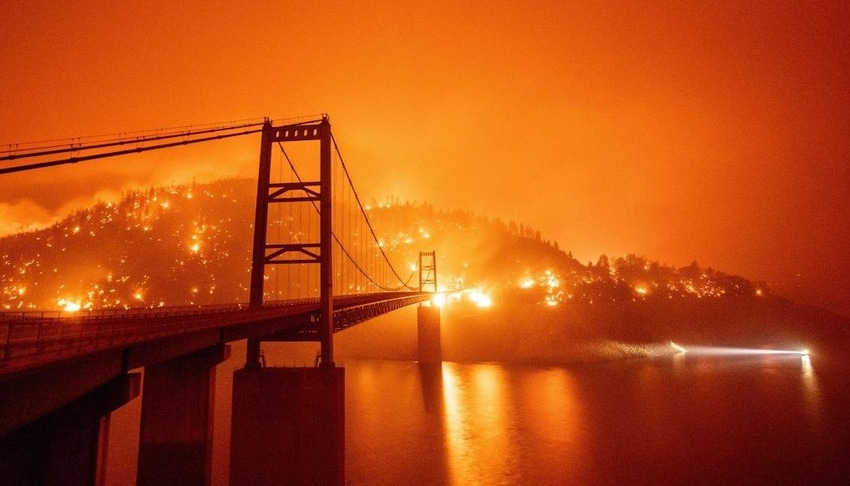
Premonition is defined as “a strong feeling that something is about to happen, especially something unpleasant.”
Prediction is explained as “a statement about a future event, often based upon experience or knowledge.”
It’s pretty axiomatic that when summer arrives in California, it brings with it an increase in wildfire incidents and the count is already underway with California Department of Forestry and Fire Protection (CAL FIRE) numbers already north of 16,000 acres burned --- about four times the number reported in the same timeframe last year.
And 2020 was the worst year on record, going back to 1933, with more than 4 million acres damaged or destroyed by wildfires so out-of-control that they forced the coining of a new term, a gigafire, referring to one blaze that burns over a million acres.
Drought coupled with extreme heat conditions have lead CAL FIRE to predict a 2021 fire season that would be even longer and more harsh than last year’s infernos.
If you were involved in it, there’s no need to rehash the destructive details or to linger on the anticipated “repeat-and-then-some” prophecy for this year with all signs indicating yet another severe wildfire season.
CFB-sponsored bill
Working in advance to provide some form of protection, a bill to improve fire insurance options for farmers and ranchers, sponsored by the California Farm Bureau, has moved a step closer to reality with committee approval and advancement to the full Assembly.
Put forth by Baldwin Park Democratic Senator Susan Rubio, Senate Bill 11 would authorize the state’s insurer of last resort, the California FAIR Plan, to underwrite insurance coverage for commercial farms and ranches in need of protection.
“It’s crucial the bill gain passage as soon as possible,” says Jamie Johansson, CFB President. “Farmers and ranchers in wildfire-prone regions are having their insurance policies canceled and often can’t find any replacement coverage. This is an emergency needing to be addressed immediately.”
The California Farm Bureau, based in Sacramento and representing 32,000 members statewide and part of a nationwide network of 5.6 million Farm Bureau members, carries some clout and in this case picked up public support from California’s insurance commissioner, Ricardo Lara. “It’s rare for any legislation to have the support of the agency that would ultimately implement the proposed law,” say officials of CFB.
While the FAIR Plan provides basic property insurance for those who can’t acquire it on the open market, current provisions don’t allow coverage for farm structures or equipment. “Better access to wildfire insurance is a pressing priority and SB 11 will be one part of the solution to attack the problem from every possible angle,” he says.
'We're in a good position'
Robert Spiegel takes care of governmental affairs for CFB and says: “We’re in a good position as the bill goes to full assembly for a final vote and we hope that happens before the legislature goes on its month-long summer recess on July 16. All the parties involved, from the agricultural community to the insurance community and everyone who understands the unique circumstances that agriculture has fallen under --- we don’t have any last resort insurance in this state --- those circumstances drove a lot of folks to come together to find a solution to fix this challenging dynamic.”
Among those supporters is the Napa County Farm Bureau where President Johnnie White says: “This issue has been a Number One priority for the Farm Bureau.” Napa County Farm Bureau Chief Executive Officer Ryan Klobas echoes that feeling --- “A significant number of the county’s commercial farms and
ranches have lost property insurance availability because of increased wildfire risks and this is a first step to correcting the problem.”
“This is a stop gap, triage measure, not a solution,” adds Spiegel, noting the grape-growing industry has been one of the hardest hit.
Nearly $8 billion in losses
Numbers are still being crunched on various aspects of loss, but estimates are that nearly $6 billion in losses was attributed to smoke taint and the overlying impact of COVID. In excess of 9,000 structures, including some wineries, went up in smoke and Napa, Sonoma, and Monterey County growers alone suffered a 30% loss in crop to say nothing of damaged or destroyed facilities.
“Those who have had policies dropped have been unable to find any other insurance to cover their wineries and their operations and those who have kept their policies are now paying up to ten times the amount of premiums for specifi
About the Author(s)
You May Also Like




